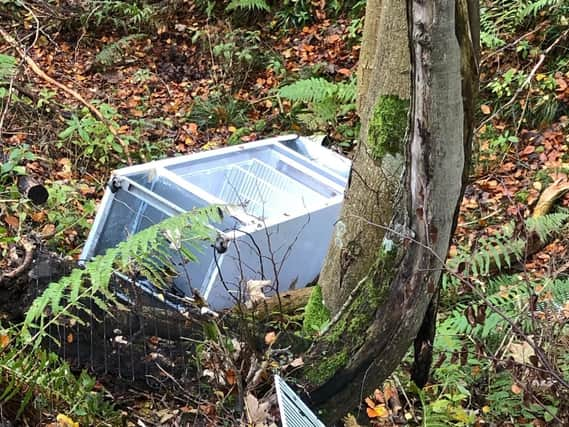Warning over escalating problems for farmers caused by fly-tipping


Countryside communities have long been the target for offenders dumping rubbish in often isolated locations, but concerns are increasing over the number of cases and the impact that fly-tipping is having on the under-pressure budgets of farming businesses.
Tony Laking, of Farmers and Mercantile Insurance Brokers, said landowners and farmers were often left to deal with piles of rubbish dumped on their land with little or no assistance.
Advertisement
Hide AdAdvertisement
Hide Ad“Councils spend millions of pounds every year on clean-up costs but private landowners, such as farmers, are suffering in silence,” he said.
The Department for Environment, Food and Rural Affairs released data last month which showed an eight per cent increase in incidents of fly-tipping on public land in 2018/19.
However, Mr Laking, who works across Yorkshire, warned the figures did not accurately reflect the true scale of the problem faced by farmers and landowners.
Farmers urged to take advantage of free health checks as winter sets inFox hunting and Labour’s animal rights agenda misrepresents the key rural issues at this general election – Sarah LeeThe Country Landowners Association (CLA) also said that, although the figures do not reflect the true scale of the crime, they did act as a barometer and show that after a static
Advertisement
Hide AdAdvertisement
Hide Adyear in 2018, fly-tipping had returned to a long-term upward trend.
The CLA’s Yorkshire rural advisor, Libby Bateman, said: “Our members are all too tired of not only cleaning up other people’s rubbish but paying for the privilege of doing so.
“It costs on average £1,000 to clean up each incident. With many rural businesses suffering multiple incidents, it can quickly affect the bottom line dramatically.”
She also said a more co-ordinated approach was needed.
“The introduction of fees at many rubbish tips and recycling centres has meant we’re now seeing the rise of organised criminal fly-tipping. It is repeated and growing in scale and it is vital that rural police forces recognise the changing nature of this crime and respond accordingly.”
Advertisement
Hide AdAdvertisement
Hide AdThe NFU’s West Riding county chairwoman, Rachel Hallos, also claimed efforts to tackle fly-tipping were being undermined by a piecemeal approach.
LNER are sending a High Speed Train in British Rail livery on a farewell tour of the East Coast Main LineExtinction Rebellion claims Wakefield Council has 'failed to act' on climate change pledge in letterMrs Hallos, who farms in Ripponden, Calderdale, has just seen the resolution of a long-standing issue with fly-tipped rubbish on private land in the middle of her rented farm.
She said: “Every council has a different approach, some charge, some don’t, some have permit applications. I understand it depends on budgets, but if there were a unified programme in place it may help.”
Sir Edward Milbank, who runs the Barningham Estate in Richmond, said he felt that if people could take their rubbish directly to a rubbish tip without having to pay a fee, fly-tipping would be dramatically reduced.
Advertisement
Hide AdAdvertisement
Hide AdSir Edward said he had to deal with fly-tipping several times a year and the latest incident last month saw an old chest freezer and fridge dumped in the ancient woodland of Gill Beck on the estate.
He said: “We did not have to pay for removal this time, Durham County Council was very helpful.”